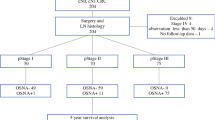Abstract
Background
Survival results of stage II colorectal cancer patients have led to major efforts to identify the subset of patients at risk for disease relapse and adjuvant therapies benefit. Immunohistochemistry is being explored to detect undetectable microscopic lymph node micrometastases.
Material and methods
A retrospective analysis of a 105 consecutive stage II colorectal cancer patients was performed. Two four-micres sections were obtained from each lymph node. These slides were stained with AE1–AE3 monoclonal antibodies against cytoskeleton using DAKO EnVision™ visualization system. Micrometastases were identified either as isolated cells or as well-defined glandular cell clusters with cytoplasm but not the nucleus stained with cytoskeleton antibodies.
Results
665 lymph nodes isolated from 105 patients were analyzed. Lymph nodes micrometastases were assessed in 26 out of the 105 patients. 42 (6.3%) out of 665 lymph nodes were infiltrated. Most of these metastases consisted of isolated cell cluster localized in marginal and interfollicular sinus of lymph nodes. The relapse rate was 23.1% among the patients with immunohistochemical detected lymph node micrometastes and 20.3% for the patients without lymph node involvement. This result lacked statistical significance (p=0.759).
Discussion
AE1/AE3 lymph node immunohistochemical staining in stage II colorectal cancer is an interesting biological phenomenon but it fails to identify patients at higher risk of relapse who deserve a more aggressive adjuvant attitude.
Similar content being viewed by others
References
Jewal A, Tiwari R, Murray T, et al. Cancer statistics, 2004. CA Cancer J Clin. 2004; 54:8–29.
TNM Atlas Ilustrated guide to the TNM/pTNM Classification of Malignant Tumours. P Hermanek, RVP Hutter, LH Sobin, Ch Wittekind (eds), Sprong Verlag, Berlin, Heidelberg, New York Tokyo 5th edition 1997. p. 104.
Mc Leod HL, Murray GI. Tumour markers of prognosis in colorectal cancer. Br J Cancer, 1999;79:191–203.
Deans GT, Parks TG, Rowlands BJ, et al. Prognostic factors in colorectal cancer. Br J Surg. 1992;79:608–13.
Compton C, Fenoglio-Preiser CM, Pettigrew N, et al. American Joint Committee on Cancer Prognostic Factors Consensus Conference: Colorectal Working Group. Cancer. 2000;88:1739–57.
Fleshman JW, jr. The effect of the surgeon and the pathologist on patient survival after resection of colon and rectal cancer. Ann Surg 2002;235:464–5.
Shida H, Ban K, Matsumoto M, et al. Prognostic significance of location of lymph node metastases in colorectal cancer. Dis Colon Rectum. 1992;35:1046–50.
Kune GA, Kune S, Field B, et al. Survival in patients with large-bowel cancer. A population-based investigation from the Melbourne Colorectal Cancer Study. Dis Colon Rectum. 1992;33:938–46.
Moertel CG, Fleming TR, Macdonald JS, et al. Fluorouracil plus levamisole as effective adjuvant therapy after resection of stage III colon carcinoma: A final report. Ann Intern Med 1995;122:321–6.
Macdonald JS, Astrow AB. Adjuvant therapy of colon cancer. Semin Oncol. 2001;28:30–40.
Zheng YC, Tang YY, Zhou ZG, et al. Tumor micrometastases in mesirectal lynph nodes and their clinical significance in patients with rectal cancer. World J Gastroenterol. 2004;10(22):3369–73.
Nan KJ, Qin HX, Yang G. Prognostic factors in 165 elderly colorectal cancer patients. World J Gastroenterol. 2003;9(10): 2207–10.
Ohrling K, Edler D, Hallström, et al. Detection of Thymidylate Synthase Expression in Lymph Node Metastases of Colorectal Cancer Can Improve the Prognostic Information. J Clin Oncol. 2005;23(24):5452–4.
Kune GA, Kune S, Field B, et al. Survival in patients with large-bowel cancer. A population-based investigation from the Melbourne Colorectal Cancer Study. Dis Colon Rectum. 1990;33:938–46.
Moertel CG, Fleming TR, Macdonald JS, et al. Fluorouracil plus levamisole as effective adjuvant therapy after resection of stage III colon carcinoma: A final report. Ann Intern Med 1995;122:321–6.
Macdonald JS, Astrow AB. Adjuvant therapy of colon cancer. Semin Oncol. 2001; 28:30–40.
Moore HC, Haller DG. Adjuvant therapy of colon cancer. Semin Oncol. 1999;26: 545–55.
Tokunaga E, Maehara Y, Oki E et al. Application of quantitative RT-PCR using «TaqMan» technology to evaluate the expression of CK 18 mRNA in various cell lines. J Exp Clin Cancer Res. 2000;19:375–81.
Cutait R, Alves VA, Lopes LC, et al. Restaging of colorectal cancer based on the identification of lymph node micrometastases through immunoperoxidase staining of CEA and cytokeratins. Dis Colon Rectum. 1991;34:917–20.
Greenson JK, Isenhart CE, Rice R, et al. Identification of occult micrometastases in pericolic lymph nodes of Duke’s B colorectal cancer patients using monoclonal antibodies against cytokeratin and CC49. Correlation with long-term survival. Cancer. 1994;73:563–9.
Jeffers MD, O’Dowd GM, Mulcahy H, et al. The prognostic significance of immunohistochemically detected lymph node micrometastases in colorectal carcinoma. J Pathol. 1994;172:185–7.
Adell G, Boeryd B, Franlund B, et al. Occurrence and prognostic importance of micrometastases in regional lymph nodes in Dukes B colorectal carcinoma: an immunohistochemical study. Eur J Surg 1996; 162:637–42.
Oberg A, Stenling R, Tavelin B, et al. Are lymph node micrometastases of any clinical significance in Duke’s Stages A and B colorectal cancer? Dis Colon Rectum. 1998;41:1244–9.
Isaka N, Nozue M, Doy M, et al. Prognostic significance of perirectal lymph node micrometastases in Dukes B rectal carcinoma: an immunohistochemical study by CAM5.2 Clin Cancer Res. 1999;5:2065–8.
Clarke G, Ryan E, O’Keane JC, et al. The detection of cytokeratins in lymph nodes of Duke’s B colorectal cancer subjects predicts a poor outcome. Eur J Gastroenterol Hepatol. 2000;12:549–52.
Zhou ZW, Rieger N, Ruszkievicz A, et al. Detection of lymph nodes micrometastases in Duke’s A and B colorectal cancer using anti-cytoqueratin antibodies AE1/AE3. World J Gastroenterol. 2005;11(3):3640–3.
Bukholm IR, Bondi J, Wiik P, et al. Presence of isolated tumour cells in mesenteric lymph nodes predicts poor prognosis in patients with stage II colon cancer. Eur J Surg Oncol. 2003;29:862–6.
Author information
Authors and Affiliations
Corresponding author
Rights and permissions
About this article
Cite this article
García-Sáenz, J.A., Sáenz, M.C., González, L. et al. Significance of the immunohistochemical detection of lymph node micrometastases in Stage II Colorectal Carcinoma. Clin Transl Oncol 8, 676–680 (2006). https://doi.org/10.1007/s12094-006-0038-4
Received:
Revised:
Accepted:
Issue Date:
DOI: https://doi.org/10.1007/s12094-006-0038-4




